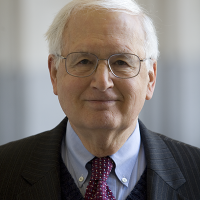China 1945 / U.S.-China 2015
Major Inflexion Points in Sino-American relations
The Kissinger Institute took a fresh new look at U.S.-China relations in this discussion on the goals, beliefs, and contingencies that shaped and still are shaping relations since 1945. Richard Bernstein, former New York Times reporter, and former Ambassador to China, J. Stapleton Roy, discussed Bernstein’s new book China 1945, and other key inflexion points in the relationship: the Opening of 1972, to Tiananmen in 1979, and the fraught reassessment of U.S.-China relations that we are in the midst of currently.
Bernstein began with a nod to the Japanese Invasion in 1937 – a turning point for the Communist Party. The Japanese, he pointed out, brought about what they feared most: Communist victory. He argued that without the distraction of the invasion, the Nationalists might have forced the Communists to retreat into Russia.
But he said that 1945 also loomed large, especially for U.S. relations with the Chinese Communists, which were “pretty good” at the beginning of the year and “extremely bad” by the end. A U.S. Army observation group, known as the Dixie Mission, spent several cordial months in Yenan in 1944-45. But by April 1946, the Marshall Mission, a U.S. effort to reconcile the Communists and the Nationalists, was an empty shell.
As early as August 1945, both the Communist and American views of one another soured. As the Japanese retreated, the Americans ferried Nationalist troops into the evacuated territory in what Bernstein called, “the most massive short-term transfer of people by air that had ever taken place.” The Communists, poised and better positioned to take that territory, were not happy. The dispatch of 50,000 American Marines to protect ports and rail lines also irritated the Communists who saw them as an obstacle to their own military ambitions.
The weeks immediately following Japan’s surrender also saw the first military conflict between the United States and the Communists, who began ambushing Marine-guarded convoys. But it was not until an ambush at Anping village in 1946 left four Marines dead that Marshall lost patience with the Communists. He realized that their attitude was inimical to the United States, Bernstein said.
The Communists continued to pay some lip service to negotiations through 1947, but both the Nationalists and Communists knew there would be war and that “whoever wins would win it all.”
Was China the United States’ to Lose?
Robert Daly, Director of the Kissinger Institute asked whether the United States made a difference in China in the 1940s, or was it, as General Stillwell said, “as if we were never there” at all? Bernstein argued that ultimately “China wasn’t ours to win or lose.” Then, and even more so now, the United States “has only the illusion of influence in China.”
Ambassador Roy said he has wrestled for decades with the same question of whether things could have gone differently, especially in 1949, when the U.S. ambassador spurned overtures from the Chinese Communists. Now, he says he has come to the same conclusion as Bernstein. The United States and China’s “ideological differences were such that it would have been impossible to have established any sort of a stable relationship…That we could recognize a government ideologically hostile to us was simply not a realistic possibility.”
But individuals and their decisions can alter the course of history and U.S.-China relations. Bernstein pointed out that Mao did not have to ally China so completely with the Soviet Union. He could have pursued a path similar to Indian leader Jawaharlal Nehru or Yugoslov dictator, Josip Tito, and left room for dialogue with the United States. But he did not.
Roy cites Nixon and Kissinger, who saw the chance for a breakthrough in U.S.-China relations in 1972 when the China-Soviet relationship deteriorated. No one else thought it could be done, said Roy, but “Nixon understood that the U.S. no longer stood to gain from a hostile relationship with China.”
According to Roy we are currently experiencing another inflection point in the U.S.-China relationship. Today, the United States and China aren’t focused on the common Soviet threat. Instead, Roy said, “the U.S. sees a superpower rival.” As the world’s lone superpower, the United States’ commitment to improving its relationship with China and the rest of Asia has been hindered by its commitments abroad, such as its continued involvement in the Middle East and instability in Europe.
Meanwhile, China’s influence in the region is growing thanks to massive infrastructure initiatives such as the Asian Infrastructure Investment Bank (AIIB) and the New Silk Road Initiative. “We can’t play in that game,” lamented Roy. “Our economy cannot generate the public funds necessary to carry out a major country’s foreign policy.”
Today the United States faces neither a Chinese civil conflict nor a Cold War, but the question of what kind of great power China is becoming, and how the United States should respond. According to Ambassador Roy, unlike in 1945, the outcome can be influenced by individuals with “proper vision” from both sides.
--Claire Mufson and Sandy Pho
Speakers

Founding Director Emeritus, Kissinger Institute on China and the United States

Hosted By

Kissinger Institute on China and the United States
The Kissinger Institute works to ensure that China policy serves American long-term interests and is founded in understanding of historical and cultural factors in bilateral relations and in accurate assessment of the aspirations of China’s government and people. Read more
